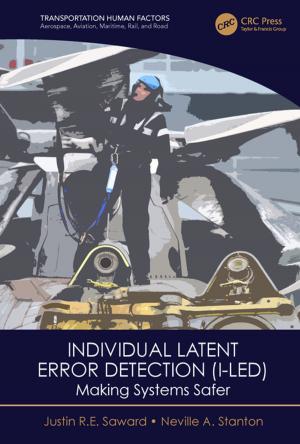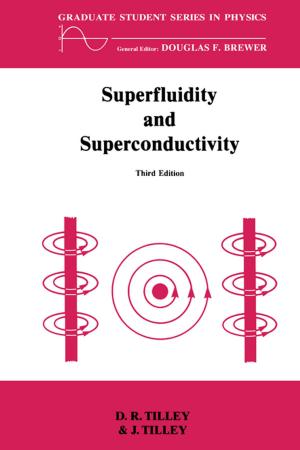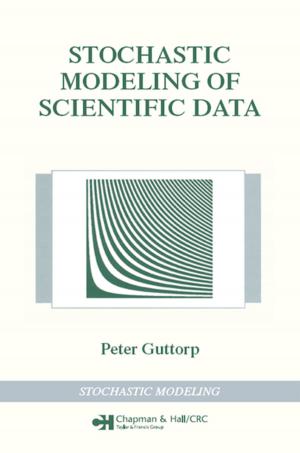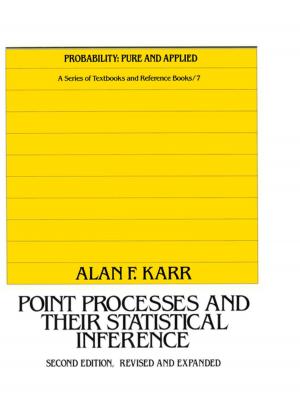Aviation Psychology: Practice and Research
Nonfiction, Reference & Language, Transportation, Aviation| Author: | ISBN: | 9781351956260 | |
| Publisher: | CRC Press | Publication: | March 2, 2017 |
| Imprint: | Routledge | Language: | English |
| Author: | |
| ISBN: | 9781351956260 |
| Publisher: | CRC Press |
| Publication: | March 2, 2017 |
| Imprint: | Routledge |
| Language: | English |
In the well-established aviation system, the importance of sound human factors practice, based on good aviation psychology research, is obvious from those incidents and accidents resulting from its neglect. This carefully structured book presents an up-to-date review of the main areas in the field of Aviation Psychology. It contains current thinking mainly from Europe, but with input from Australia and North America, from specialists involved in research, training and operational practice. Spanning six parts, the book covers: Human Engineering, Occupational Demands, Selection of Aviation Personnel, Human Factors Training, Clinical Psychology, Accident Investigation and Prevention. Looking at the six parts - in human engineering, the reader learns about human-centered automation as well as human factors issues in aircraft certification. Results derived by job analysis methods are presented in the next part and serve as basic information in the design of selection and training programs. In selection, computerized testing or behaviour-oriented assessments are challenging approaches for personnel recruitment. Cost-benefit analyses in selection reveal convincing results, enabling organizations to save huge amounts of inappropriate training investment by the application of proper selection tests. The NOTECHS method is described which helps to assess CRM capabilities in training and can also be used to measure training effects in systematic validation studies. Although operational personnel in aviation are usually able to cope with stress more efficiently than other occupational groups, individual problems might develop as reactions to traumatic influences. Either a psychological evaluation or a proper treatment or both is then required as described in the 'Clinical Psychology' part of the book. The readership includes: aviation psychologists and flight surgeons, training, selection and recruitment specialists, instructor pilots, CRM facilitators, personnel managers, accident investigators, safety pilots, air traffic controllers, aircraft engineers and those dealing with human-machine interfaces.
In the well-established aviation system, the importance of sound human factors practice, based on good aviation psychology research, is obvious from those incidents and accidents resulting from its neglect. This carefully structured book presents an up-to-date review of the main areas in the field of Aviation Psychology. It contains current thinking mainly from Europe, but with input from Australia and North America, from specialists involved in research, training and operational practice. Spanning six parts, the book covers: Human Engineering, Occupational Demands, Selection of Aviation Personnel, Human Factors Training, Clinical Psychology, Accident Investigation and Prevention. Looking at the six parts - in human engineering, the reader learns about human-centered automation as well as human factors issues in aircraft certification. Results derived by job analysis methods are presented in the next part and serve as basic information in the design of selection and training programs. In selection, computerized testing or behaviour-oriented assessments are challenging approaches for personnel recruitment. Cost-benefit analyses in selection reveal convincing results, enabling organizations to save huge amounts of inappropriate training investment by the application of proper selection tests. The NOTECHS method is described which helps to assess CRM capabilities in training and can also be used to measure training effects in systematic validation studies. Although operational personnel in aviation are usually able to cope with stress more efficiently than other occupational groups, individual problems might develop as reactions to traumatic influences. Either a psychological evaluation or a proper treatment or both is then required as described in the 'Clinical Psychology' part of the book. The readership includes: aviation psychologists and flight surgeons, training, selection and recruitment specialists, instructor pilots, CRM facilitators, personnel managers, accident investigators, safety pilots, air traffic controllers, aircraft engineers and those dealing with human-machine interfaces.















